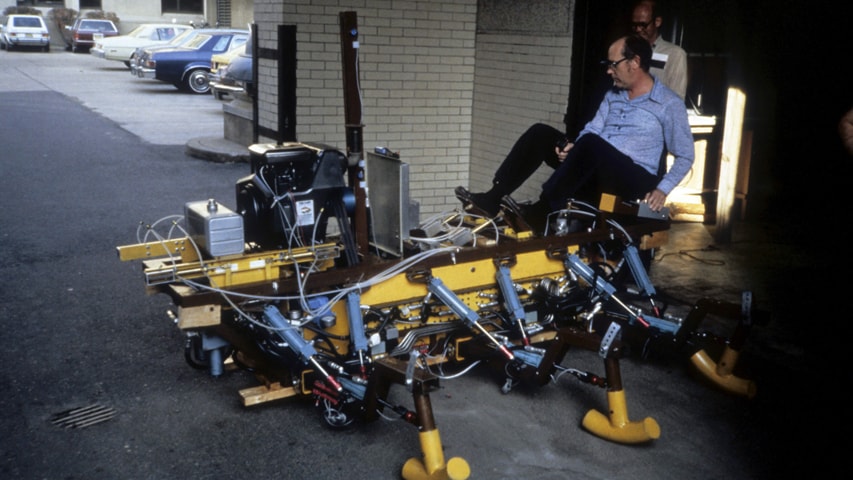Sutherland’s "Trojan Cockroach" Celebrated in Posner Center Exhibit
Six-Legged Walking Robot Was First Capable of Carrying Humans
By Byron Spice 412-268-9068 / bspice@cs.cmu.edu
In this photo from the early 1980s, Ivan Sutherland pilots the six-limbed Trojan Cockroach he created at the Robotics Institute.
A six-legged walking robot built at Carnegie Mellon University in the early 1980s under the leadership of noted alumnus Ivan Sutherland is the subject of an exhibit opening Jan. 15 at the university’s Posner Center.
The exhibit, “Ivan Sutherland’s Trojan Cockroach,” was developed by Daniel Pillis, a master’s degree student in the College of Fine Arts, and tells the story not only of walking robots, but also computer graphics and the origins of the technology underlying modern advances in robotics.
Sutherland, who earned a bachelor’s degree in science at Carnegie Tech in 1959, is best known for his contributions to computer graphics, for which he was awarded the Association for Computing Machinery’s prestigious A.M. Turing Award in 1988.
In the early '80s, Sutherland returned to CMU to build his walking machine. Considered the first computer-controlled walking robot capable of carrying a human, the Sutherland Walker was about eight feet long; a gasoline engine drove the hydraulics controlling its six legs. As it walked, it maintained its balance by always keeping three feet on the ground. The Trojan Cockroach, along with Marc Raibert’s pioneering work in Carnegie Mellon’s Leg Lab, was featured in the January 1983 issue of Scientific American.
The exhibit, sponsored by the Posner Center Internship Program, showcases Sutherland’s work as well as the role walking machines have played in the development of the field of robotics. It includes artifacts from the original robot, a history of Sutherland’s work and rare and hard-to-find images of walking robots, as well as previously unseen video footage and a virtual reality simulation.
It also delves into design philosophies for machines that seek to replicate biological skills and agility — what should the computer do and how much “intelligence” should be built into the physical machine itself?
The exhibit opening event, including an appearance by Sutherland, is at 5 p.m., Jan. 15 and the exhibit will be open from 1 to 4 p.m. weekdays through the spring semester.
Watch the video.